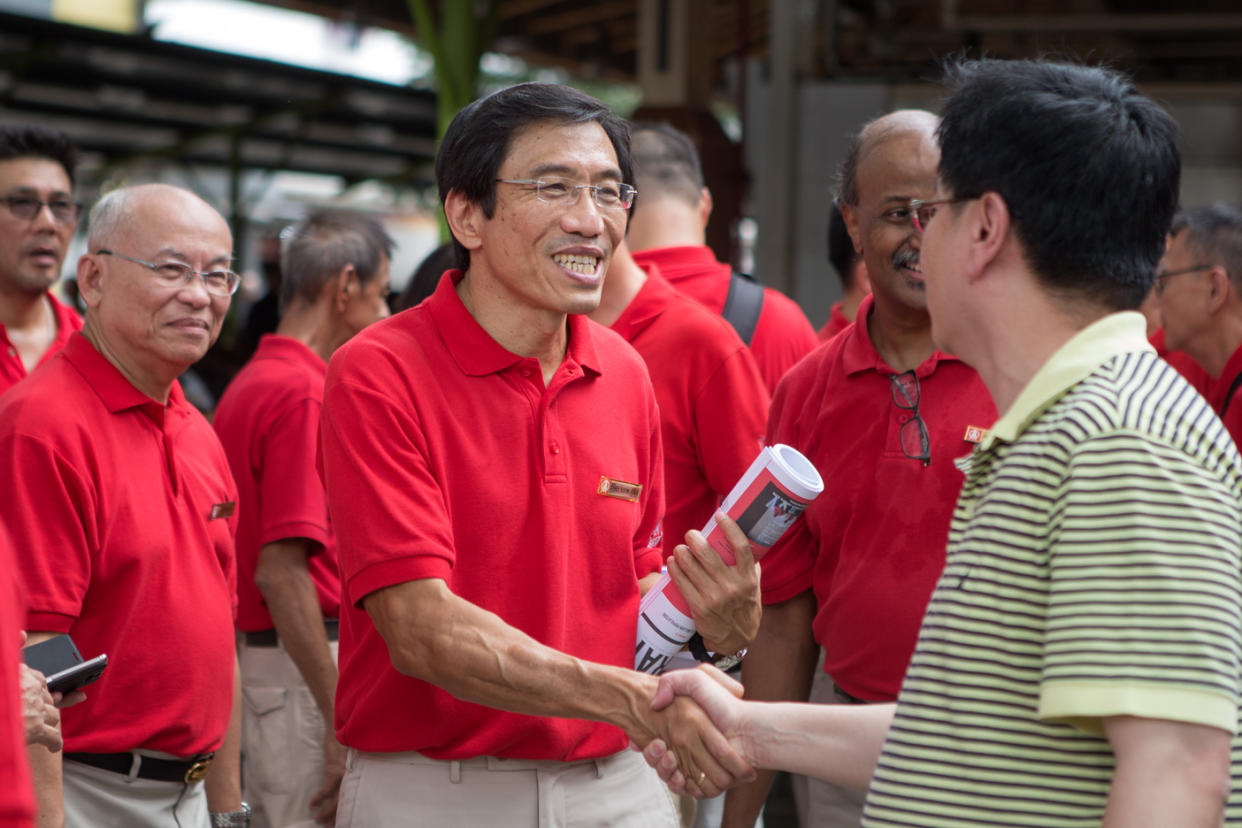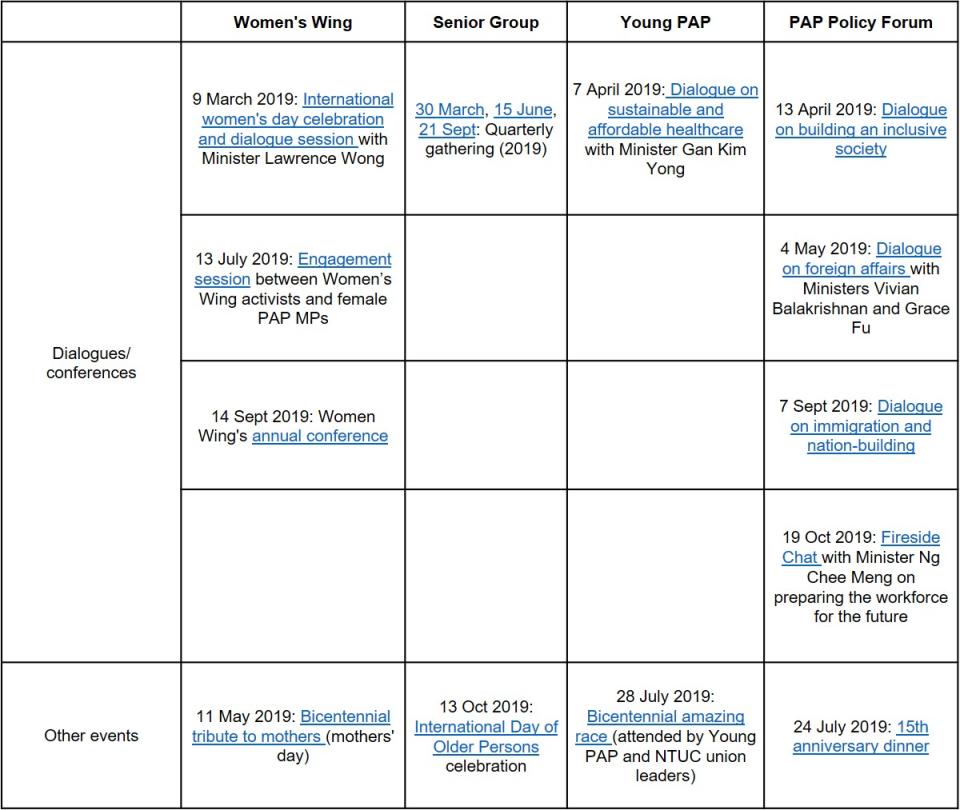General Election: The political positions of Singapore's parties

By Christalle Tay
In the third of a four-part series on how political parties in Singapore are gearing up for the next General Election, Yahoo News Singapore examines their respective policy positions.
SINGAPORE — Slogans do little to distinguish political parties from each other. Typically, they revolve around themes about the future and the people.
In the 2015 General Election, the People’s Action Party (PAP) unveiled its “With you, for you, for Singapore” slogan. It is not too dissimilar to the Singapore People’s Party (SPP) calling for “Service before self. For the nation. For the people” or Progress Singapore Party (PSP) stating it is “For country, for people”. In comparison, the Reform Party expresses hopes of “A brighter future tomorrow, today”.
But the competing parties are well aware that voters are more interested in specific policy details. The PAP, for instance, recently explained their positions on the personal mobility device (PMD) measures and the subsequent grant to help food delivery riders replace their devices, as well as amendments to the Maintenance of Religious Harmony Act in October – for which the PAP produced a Facebook video summarising the significance of the changes.
Three of PAP’s subgroups – PAP Women’s Wing, Young PAP and PAP Seniors Group – represent the interests of women, youths and seniors, and make policy recommendations from the perspectives of the demographic they represent. The fourth, the PAP Policy Forum, engages the party on policy matters.

Besides convening dialogues, the subgroups also write papers. The Women’s Wing, in a position paper released in July, proposed measures for affordable childcare, inclusivity of children with special needs, mobility for women in the workplace and better access for women to In-Vitro Fertilisation (IVF).
The Seniors Group’s position paper was released in January, suggesting measures such as the increase of the Central Provident Fund contribution rates for older workers, group homes for seniors and allowance for those who care for their elderly relatives full-time.
Opposition voices
On the other hand, the Workers’ Party (WP) thinks that parliamentary sessions are the best showcase for its sitting Members of Parliament (MPs) and Non-Constituency MPs (NCMPs) to outline the party’s positions on different issues. Videos of parliamentary speeches are regularly posted on Facebook, and the accompanying speech transcripts uploaded to its website.
WP also occasionally publishes press releases. The latest one, published in October, showed its support for concerns brought up at the SG Climate Rally on 21 September. It highlighted the proposals in Parliament by WP MPs to mitigate climate change effects such as calling for the use of sustainable building materials and technology.
The party’s other press releases included speaking out against Malaysian vessels encroaching on Singapore waters in 2018, cautioning against amending the Protection from Harassment Act (POHA) to protect the government in 2017, and calling for more inclusivity for people with disabilities in 2016.
Policy papers and speeches made by the WP MPs during the previous Budget debate are also available on its website. Public statements by WP and commentaries written by its non-Parliament members on issues such as the Goods and Services Tax hike and public schools’ current class size are published under its news section.
SDP has been the most active on the policy front, and was the first to launch a manifesto for the next general election. The manifesto, which was launched on 29 September, highlights its proposals for healthcare and education.
In place of the three pillars of national healthcare financing – Medisave, Medishield and Medifund – the SDP is suggesting a single insurance scheme, the National Health Investment Fund. Its “alternative education policy” takes elitism head-on, calling for the nationalisation of preschools and the scrapping of Primary School Leaving Examinations (PSLE), school and class rankings. The policy proposes broader curriculum and smaller class sizes – of no more than 20 students.
One proposal by the SDP has received considerable media coverage: the Non-Open Market (NOM) scheme for public housing, first floated in 2012. Pitched as the solution to Singapore’s depreciating 99-year-lease problem, NOM flats would exclude land costs from their prices and only charge for construction costs. These cheaper flats would exist in tandem with normal, open-market flats, but unlike open-market flats, would be sold back to the Housing Development Board (HDB).
On the other hand, PSP has been keeping its policy ideas close to its chest. But the speeches given by PSP’s central executive committee members at the party’s launch on 3 August gave an indication about its policy stance. Secretary-general Tan Cheng Bock called for more transparency and a review of the India-Singapore’s Comprehensive Economic Cooperation Agreement (CECA), specifically its effects on employment of foreign talent. PSP also called for greater government support for local businesses, affordable healthcare, lower ministerial pay and a lowering of the voting age from 21 to 18.
Dr Tan wants accountability and transparency in the government – a familiar narrative echoed by other opposition politicians. When he was a PAP MP, Singapore’s first prime minister Lee Kuan Yew had portrayed him as a voice of dissent within the party, according to the retired doctor, who now aims to play the same role as an opposition politician.
Christalle is a final-year Communications and New Media Department undergraduate.
Related links:
General Election: How active have Singapore political parties been on the ground?
General Election: What Singapore's political party websites tell you about them
Toting up the Bills: Debating legislation in Parliament
Municipal projects: Which town councils got how much in CIPC funds?
Social media outreach: How our politicians fare
Town council websites to look at when you’re nostalgic for old-school internet
Parliament: Record number of motions filed by MPs
Parliament Q&A: Facts and figures can be touchy subjects too
Which MPs have asked the most questions in Parliament?
And the minister most often up on his own two feet was....


